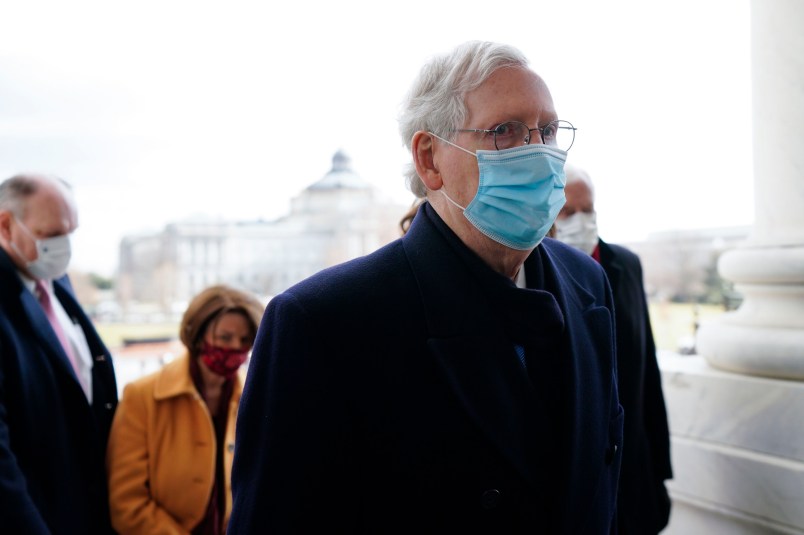Before the inaugural fireworks have fully faded from our retinas, Senate Minority Leader Mitch McConnell (R-KY) is making clear that he intends to hold President Joe Biden’s nominees and legislative agenda hostage until Democrats agree to cede some of their power.
As the 50-50 Senate tries to set up its power-sharing deal — how the committees will be composed, shifting the chairmanships — it’ll have to vote on an organizing resolution codifying those rules.
Publicly, McConnell has tacitly threatened to filibuster that resolution, keeping the Senate in a bizarre limbo with the new senators absent from any committees and Republicans still holding chairmanships and committee majorities left over from the previous Congress. His demand? That Democrats promise not to get rid of the filibuster later, which would lower the threshold from 60 votes to 51 to pass all legislation. Since Democrats won the White House, Vice President Kamala Harris could provide that 51st vote, severely curtailing McConnell’s power.
But the risk McConnell is taking is substantial: Democrats could refuse his demands, and, infuriated by his telegraphed desire to both gridlock the Biden administration now and in the future, abolish the filibuster now.
“The question I have right now is whether McConnell’s threats to stall the Biden agenda are enough to drive the caucus to make that decision once and for all,” said Jim Manley, former spokesman for Senate Majority Leader Harry Reid and the Senate Democratic caucus.
Calling the filibuster a “crucial part of the Senate,” McConnell waxed poetic on its use as a bipartisan tool during his Thursday floor speech. (He did not acknowledge the fact that he himself extended the nuclear option to Supreme Court nominations in 2017 and to shorten debate times in 2019.)
“If the talk of unity and common ground is to have meaning, and certainly if the rules from 20 years ago are to be our guide, then I cannot imagine the Democratic leader would rather hold up the power-sharing agreement than simply reaffirm that his side won’t be breaking the standing rule of the Senate,” he said.
He has reportedly been pressuring Senate Majority Leader Chuck Schumer (D-NY) on the issue in private negotiations as well.
So far, Democrats have not taken kindly to the hostage-taking.
“It’s an absolutely unprecedented, wacky, counterproductive request,” Sen. Brian Schatz (D-HI) tweeted. “We won the Senate. We get the gavels.”
Accordingly, Majority Whip Dick Durbin (D-IL), the second-highest ranking Democrat in the Senate, firmly dismissed McConnell’s demand.
“Unfortunately we’re not going to give him what he wishes,” he told reporters on Thursday. “If you did that then there would be just unbridled use of it. I mean nothing holding him back.”
McConnell’s power grab leaves Democrats in a difficult position. They don’t want to capitulate to such a request in the very first days of Biden’s administration or to lose the power of the nuclear option threat down the line. But they also don’t want McConnell to drag the fight out, leaving Republicans in charge of key committees and blocking Biden’s nominees in the meanwhile.
Overlaying the whole situation is the relatively uncharted waters of a 50-50 split. They are historically rare, the last one happening in 2001 when Senate leaders Trent Lott (R-MI) and Tom Daschle (D-SD) forged a power-sharing agreement splitting the committees equally but giving the party with the tie-breaking vote, then Republicans, the chairmanships and power to convene the committees.
Schumer is still hoping to get McConnell to agree to that arrangement, telling reporters Thursday that he still wants to enact the 2001 deal absent any “extraneous provisions.”
But if McConnell won’t play ball, if he sticks to his guns on the filibuster demand, what then?
“They are nowhere fast, despite previous comments to the contrary,” Manley said. “They are nowhere in dealing with the organizing resolution, and it does not bode well for the early days of the Biden administration.”
But still, McConnell is taking a gamble. He’s currently providing Democrats with few options, as Manley explained: accede to a demand they find logistically unreasonable and optically weak, agree to his arrangement now and renege on it later or, the very thing he’s working to prevent — blow up the filibuster now and strip him of his power.
Baked into that bet is the assumption that Democrats will fail to rally their conservative members — Sens. Joe Manchin (R-WV), Kyrsten Sinema (D-AZ), etc. — who have in the past expressed opposition to getting rid of the filibuster.
But if he’s wrong, if he’s overstepped, he may have provided the push those Democrats need to get on board.
“I do think that Leader McConnell risks organizing Democrats against his position,” added Bill Dauster, Reid’s former deputy chief of staff and a 30-year Senate veteran. “Every time he makes unreasonable demands, he makes it that much easier for those who want to reform the filibuster to argue their case to Democratic Senators who are on the fence.”



